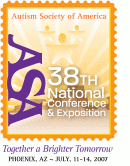 |
The ASA's 38th National Conference on Autism Spectrum Disorders (July 11-14, 2007) of ASAThe Westin Kierland Resort & Spa, Scottsdale, AZ |
| For a complete author index with session numbers, please click here | |
| Saturday, July 14, 2007: 8:15 AM-9:30 AM | |||
| Kirkland | |||
| #2997- Assessing Social Communication in Asperger Syndrome | |||
| Individuals with Aspergerís Syndrome have significant difficulty in the domain of social-pragmatic language. Their ability to effectively engage and communicate is hampered by deficits that standardized tools fail to target and sadly many speech-language pathologists have not been adequately trained to evaluate. This session will offer 11 tools to evaluate the social-communicative features of Aspergerís Syndrome that neuro-typical individuals find odd, unusual, and downright offensive. This session will also instruct participants on developing operantly based goals. | |||
| Presenter: | - Timothy Kowalski, M.A., C.C.C. is speech-language pathologist nationally known for his work with Aspergerís. He presents on this subject at national and international conferences as well as school-wide district in-services. He is the author of The Source for Aspergerís Syndrome and has received the ďTEAMS 2000 Speech-Language Pathologist of the YearĒ award for his work with autism in the four-county Orlando area. He is a graduate of Case Western Reserve University in Cleveland and of Southern Connecticut State College in New Haven. His extensive experience and positive outlook allows him to provide practical strategies participants can immediately use. | ||
|
| |||
|
It is well known that individuals with Asperger's Syndrome have deficits in social-communication skills. Speech-language pathologists are frequently called upon to address these issues both in terms of diagnostics and goal development. However, few are adequately prepared to handle the unique idiosyncrasies seen in Asperger's Syndrome. As a result, many diagnosticians use standardized tools that are not designed to assess the type of deficits seen in Asperger's Syndrome. Diagnosticians have a responsibility to choose tests that are valid for the purpose in which they are being used. Unfortunately, in the case of Asperger's Syndrome, current standardized tests for communication are not sensitive enough to provide the diagnostician with appropriate information. Ultimately this negatively impacts effective service delivery to this population. Inadequate and unobtainable social-pragmatic goals are developed. This presentation will offer participants 11 tools to help evaluate the social-communicative features of Asperger's syndrome. By using these tools, diagnosticians can acquire more relevant information with which to develop intervention strategies. It will also instruct participants on developing operant-based goals. |
|||
See more of General Submissions
See more of The ASA's 38th National Conference on Autism Spectrum Disorders (July 11-14, 2007)